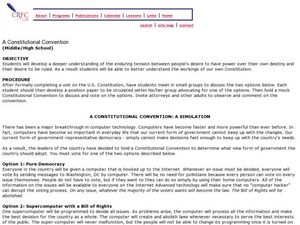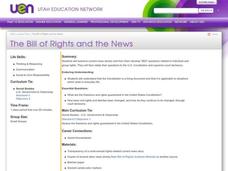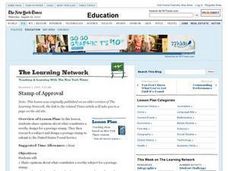Constitutional Rights Foundation
Guest-Worker Program
The U.S. Guest-Worker Program and the H-2A visa are the focus of a social studies activity. First, class members assume the role of advisors who must present the president with four proposals that would amend the visas given to...
Curated OER
The American Revolution: 1775-1783
Casting the American Revolution into a bright, informative light, this presentation details many key facts about the strategies and decision during the revolutionary campaigns. The latter half of the slides prompt viewers to examine why...
Curated OER
Voting Rights: Convicted Felons
Students explore the state right to revoke the voting privileges of convicted felons. In this voting rights lesson, students read an article and respond to discussion questions about the voting rights of felons.
Curated OER
Representation of the Common Citizen From Declaration of Independence to Present
Students create working definition of common citizen, and investigate and discuss important sections of Declaration of Independence, Articles of Confederation, U.S. Constitution, Bill of Rights, and other Amendments. Students demonstrate...
Curated OER
Constitution of the United States: Crossword Puzzle
In this United States history worksheet, students use the 16 clues in order to fill in the crossword puzzle with the appropriate answers pertaining to the Constitution of the United States.
C-SPAN
Presidential Birth Requirement
Every president of the United States must be a natural-born citizen, but the definition of natural-born is not as straightforward as it seems. Secondary scholars examine two points of view surrounding the constitutional requirement...
National Endowment for the Humanities
The "To Do List" of the Continental Congress
What is on your to-do list today? The second lesson of a three-part series on Lost Heroes of America investigates the laundry list of items in front of the second Continental Congress. Scholars research, analyze, and present information...
Curated OER
Popular Sovereignty and the Lecompton Constitution
Learners explore the purpose of the Lecompton Constitution. In this United States History instructional activity, students read several articles then complete several activities to reinforce their reading, such as a cause and...
Curated OER
The Constitution & Native Americans
Students identify and consider US Constitutional origins in American Indian culture. They discuss and consider what it means to them to attribute the origins of the US Constitution to American Indian oral tradition. They compare the...
Constitutional Rights Foundation
Driver’s Licenses And Unauthorized Immigrants
Should driver's licenses be granted to unauthorized immigrants? That is the question class members grapple with in a instructional activity that asks them to first read a fact sheet that details the arguments for and against...
Curated OER
A CONSTITUTIONAL CONVENTION: A SIMULATION
Students discuss two computerized options to change the current U.S. government. In this Constitutional Convention lesson, students write a statement advocating for one of the choices and participate in a mock modern Constitutional...
Curated OER
The Juvenile Death Penalty
Sensitive material is discussed in this lesson plan. Please review to ensure that the content is suitable for your class. The topic is the Eighth Amendment and how the U.S. Supreme Court makes determinations about what constitutes cruel...
Curated OER
Twelve Angry Men: Trial by Jury as a Right and as a Political Institution
Young scholars explore the constitutional guarantee of the right to trial by jury. In this U. S. Constitution lesson, students read or view Twelve Angry Men and respond to discussion questions regarding the jury. Young scholars examine...
Curated OER
Government Reform - Term Limits
Learners consider the need for term limits. In this U.S. government lesson, students read selected articles about the pros and cons of term limits. Learners then survey their class regarding their opinion of term limits. Students...
Administrative Office of the US Courts
Nomination Process
"I do solemnly swear that I will support and defend the Constitution of the United States..." Scholars investigate the nomination process of Supreme Court justices when assuming office. Through examination of primary and secondary...
Curated OER
The Federalist Papers
Students identify the Articles of Confederation and explain why it failed. They explain the argument over the need for a bill of rights in the Constitution and James Madison's role in securing its adoption by first Congress. Finally,...
Curated OER
A Nation's Voice
Students research the Constitution and the War Powers Act in order to determine what the powers of the government are in times of conflict. They answer a series of questions then write a legal brief either supporting or condemning the...
Curated OER
Cartoons for the Classroom: The Bush and Clinton Years
Examine how the Bush and Clinton years are an example of political dynasties. This cartoon provides a way to explore the concept and activate critical thinking skills in order to better grasp U.S. Politics. A fun and educational way to...
Curated OER
The Bill of Rights and the News
Students examine current news stories and from them develop "BIG" questions related to individual and group rights. They then relate their questions to the U.S. Constitution and supreme court decisions.
Curated OER
Legislative Branch
Students analyze Article 1 of the Constitution. They respond to the Public Criticism E-Learning module.
Curated OER
Supreme Court: Background
Students explain the role of the Supremem Court under the Constitution. They explore current evetns related to the Constitution and read about the roles of the Senate and President in selecting the next justice. They create a chart about...
Curated OER
Stamp of Approval
Students share opinions about what constitutes a worthy design for a postage stamp. They research a subject and design a postage stamp to submit to the United States Postal Service.
Curated OER
Rights Under the Fourth Amendment
Twelfth graders examine the Fourth Amendment and discuss an actual Supreme court case. They determine whether or not the person's rights were violated. they search newspapers for articles where the Fourth Amendment may have been violated
Judicial Learning Center
About Federal Judges
Not just anybody can do the job of a federal judge, but according to the United States Constitution just about anybody can be appointed. The lesson outlines the process and requirements for becoming a federal judge, focusing on the...

























